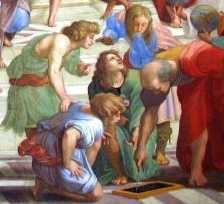I found out by reading more carefully that the Odd Tuesday and Wednesday Lauds hymns have a common source. The stanzas are chosen from a longer work entitled Morning Hymn or Hymn at Cock-Crow which is the first of twelve hymns in a larger work called the Cathemerinon, or The Daily Round. That link contains the whole book, with Latin and English translated by R. Martin Pope. That is the source of the metrical, rhyming translation I have included below.
I found an article reviewing a translation of this Prudentius hymn-collection, and here's what it says about Prudentius and his hymns:
Everything known about the life of Aurelius Prudentius Clemens is contained in a 5 verse introduction to his collection of hymns that he published in 405 C.E. When he was 57 years old. Born into a reasonably prosperous Christian family in Spain in 348, Prudentius enjoyed a typical education based on the literature and rhetoric of the classical era. He had a brief career as an advocate and held increasingly responsible positions in the imperial civil service. Tiring of the emptiness of his life, he visited Rome c.401-403. It was while touring Rome, with its combination of monuments both classical and Christian, that Prudentius vowed to spend the remainder of his life writing hymns in praise of God for an audience that was more familiar with the literature of the classical past than with Scripture-based Christianity. Thus, much of the imagery and vocabulary in Prudentius' hymns have more in common with the writings of Virgil and Ovid than the New Testament. Written in conscious imitation of the pagan hymns of Horace, Prudentius' hymns are full of images drawn from the world of nature. Rather than trying to convert his thinly Christianized audience through Scriptural exegesis or christological explanation, Prudentius lets the beauty and interrelated complexity of the natural world draw the mind towards the Creator. In contrast to various systems of gnosticism and Neoplatonism prevalent in his day, Prudentius repeatedly stressed the fact that acceptance of Christianity did not necessitate a rejection of either the created world or the physical body. On the contrary, Prudentius employs a wide variety of images from nature to proclaim God's involvement in the physical world.
This may explain the reference to "bee-glue" or fucis in yesterday's hymn. Looking up the word online reveals that fucus can mean either colored paint, rouge or the glue that bees use to seal up the entrance to their hives. The verse in the hymn says that our senses, smeared over with this substance(which probably symbolizes sin or ignorance or some artifice we use to cover it up), will be purged by Christ the light of the world. Continuing with the article:
The Cathemerinon is a set of twelve hymns included within a much larger collection of hymns by Prudentius. The first six hymns are each written for use at a particular time during the course of the day, thus giving Christians an opportunity to sanctify all the hours of the day.There is a lot more interesting information in the article, and you should read it despite the fact that it uses the annoying "C.E." in place of "A.D."
-----------------------------
Sol ecce surgit ígneus,
Behold, the sun rises all fiery
piget, pudéscit, paénitet,
it afflicts, shames, makes sorry,
nec teste quisquam lúmine
nor can any witness in this light
peccáre constanter potest.
be able to keep sinning
Soon as the sun rekindles day,
Sin slinks abashed and shamed away
For none can damning light resist
And 'neath its rays in sin persist.
Tandem facéssat caécitas,
and finally let blindness/darkness go away
quæ nosmet in præceps diu
that which we ourselves headlong
lapsos sinístris gréssibus
having slipped/fallen by left(sinister) feet/steps
erróre traxit dévio.
error drags (us) straying
And then at length let darkness flee,
Which all too long held us in fee,
'Mid wildering shadows made us stray
And led in devious tracks our way.
Haec lux serénum cónferat,
May this light serenity bring
purósque nos praestet sibi;
and may it preserve us pure for itself
nihil loquámur súbdolum:
that we may utter nothing deceitful
volvámus obscúrum nihil.
nor roll(meditate) anything dark
We pray Thee, Rising Light serene,
E'en as Thyself our hearts make clean:
Let no deceit our lips defile
Nor let our souls be vexed by guile.
Sic tota decúrrat dies,
Thus may the whole day run its course
ne lingua mendax, ne manus
neither lying tongue nor hand
oculíve peccent lúbrici,
nor inconstant eyes sin
Ne noxa corpus ínquinet.
nor some hurt(sin) stain the body
O keep us, as the hours proceed,
From lying word and evil deed,
Our roving eyes from sin set free,
Our body from impurity.
Speculátor astat désuper,
An Observer assists from above
qui nos diébus ómnibus,
who for all our days
actúsque nostros próspicit
watches our conduct
a luce prima in vésperum.
from first light unto evening
For thou dost from above survey
The converse of each fleeting day:
Thou dost foresee from morning light
Our every deed, until the night.
Deo Patri sit glória,
To God the Father glory be
eiúsque soli Fílio,
and to his only Son
cum Spíritu Paráclito,
with the Spirit Paraclete
nunc et per omne saécula. Amen.
now and through all ages.
THIS IS FUN!!!

No comments:
Post a Comment